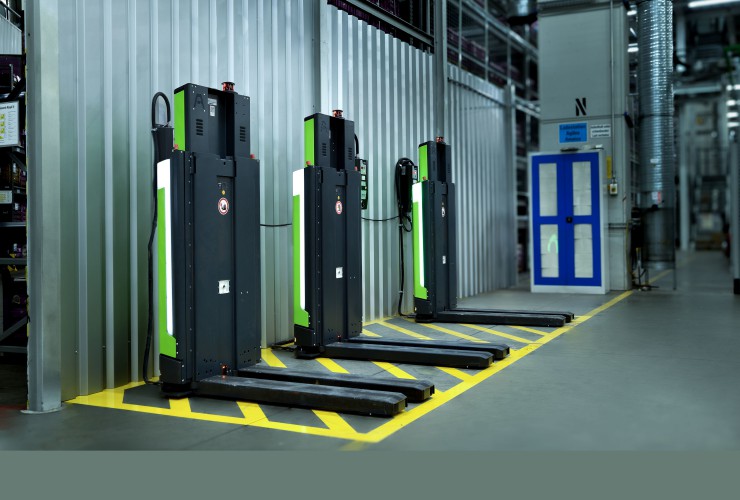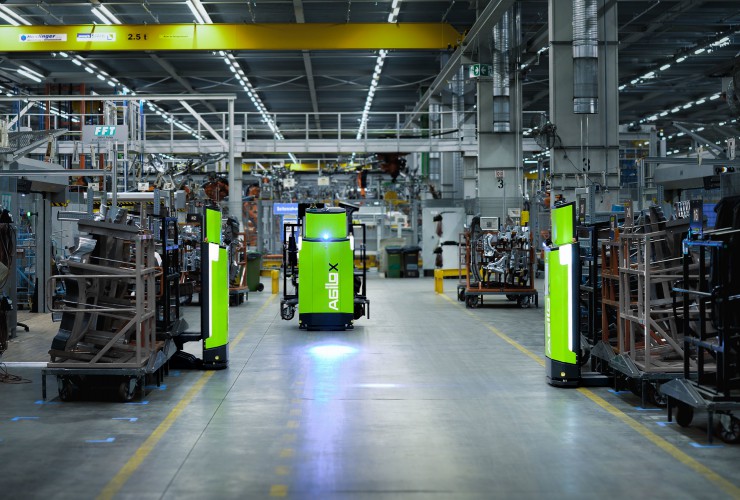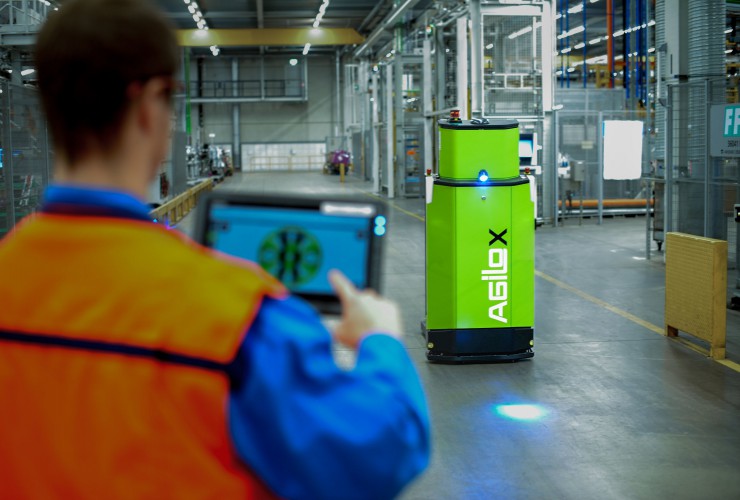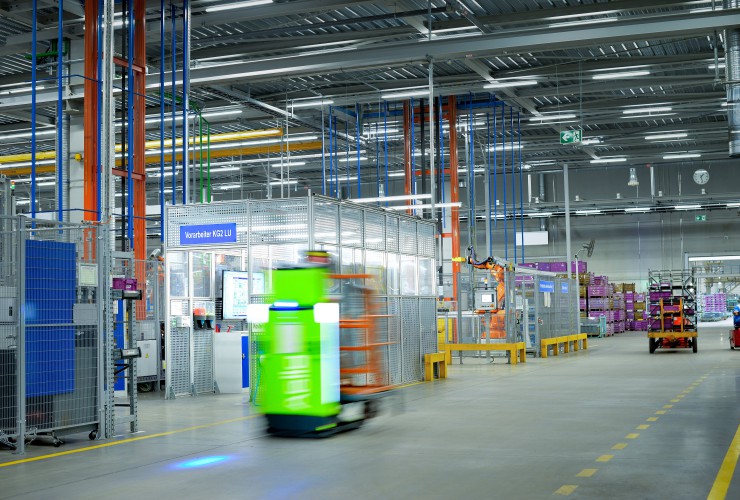IFOY Schirmherrschaft
IFOY Träger
IFOY Partner
AGILOX AMR-Flotte optimiert Produktionsversorgung bei BMW
AGILOX Services GmbH
IFOY-Kategorie
Integrated Customer Solution
Zusammenfassung
In Regensburg wird eine der größten AMR-Flotten im deutschsprachigen Raum für die Versorgung von Produktionslinien im Automotive-Bereich betrieben. Dabei stellen 27 AMRs von AGILOX den Nachschub von Fertigungsteilen zur Herstellung von Karosseriebauteilen sicher. Um dies ausfallsicher gewährleisten zu können, kommunizieren die AMRs untereinander vernetzt.
Kunde
BMW Group
Umsetzungszeitraum
Von: 01.01.2017
Bis: 31.12.2023
Bewerbungsdaten
Case Study
Der Kunde
Die BMW Group, mit Hauptsitz in München, ist einer der größten Kraftfahrzeughersteller (Autos, Motorräder) weltweit. In Regensburg betreibt das Unternehmen eines der modernsten Automobilproduktionswerke in Europa mit einer Gesamtfläche von mehr als 1,4 Millionen Quadratmetern. Insgesamt werden bis zu 1.000 Fahrzeuge der Modelle BMW 1er, BMW X1 sowie BMW X2 arbeitstäglich weltweit an Kunden geliefert.
Im Rahmen der Produktionslogistik sind im BMW Group Werk Regensburg 27 Autonome Mobile Roboter (AMR) von AGILOX im Einsatz. In einer durchschnittlichen Woche bewegt der Schwarm etwa 2.624 Tonnen und legt dabei rund 3.294 Kilometer zurück. Die Flotte in Regensburg stellt eine der größten AMR-Flotten im deutschsprachigen Raum für die Versorgung von Produktionslinien im Automotive-Bereich dar.
Die Ausgangssituation
Vor dem Einsatz der Autonomen Mobilen Roboter von AGILOX wurden Produktionslinien zyklisch mithilfe von Routenzügen versorgt. Die Bestückung der Pufferlager erfolgte manuell. Stationen konnten nur im Rahmen eines festgelegten Zyklus angefahren und bestückt werden.
Die Lösung
Im Rahmen eines Pilotprojektes zu Roboter-gestützten Transportlösungen wurde im Jahre 2017 der erste Autonome Mobile Roboter von AGILOX im BMW Group Werk Regensburg installiert. Nach einer Testphase wurde die Flotte sukzessive erweitert. Ende des Jahres 2023 befinden sich 27 AMRs im Einsatz.
Die Lösung von AGILOX basiert auf der sogenannten „X-Swarm Technology“. Dadurch können die einzelnen AMRs miteinander kommunizieren und interagieren. Es entsteht eine Schwarmintelligenz, bei der die Rechenleistung und Materialflussorchestrierung auf die einzelnen Geräte verteilt sind. Fällt ein Roboter aus, stellen die restlichen Roboter den ununterbrochenen Warenfluss sicher.
Mittlerweile versorgen 27 AGILOX ONE die Arbeitsstationen mit Fertigungsteilen für den Produktionsprozess von Karosseriebauteilen.
Arbeitsstationen werden automatisch bedarfsgesteuert bestückt. Bei kurzfristigen Bedarfen können Produktionsmitarbeiter Teile individuell bestellen. Der AGILOX ONE beliefert die Station völlig unabhängig und kann zudem für den Leerguttransport genutzt werden.
Die Bedienoberfläche kann dabei individuell an die Arbeitsstation angepasst und die Materialflusssteuerung verändert werden. Der Transport der Voll- und Leergutware erfolgt über Distanzen von mehr als 100 Meter im Mischverkehr, der Fußgänger, Stapler und Routenzüge miteinschließt. Die Geräte müssen in der Lage sein auch bei kleinsten Veränderungen einen sicheren Transportverkehr zu gewährleisten. Die Autonomen Mobilen Roboter von AGILOX erfüllen sämtliche normativ erforderlichen Sicherheitsstandards (2006/42/EG, 2014/30/EU, 2014/53/EU, EN ISO 12100:2013, EN ISO 13849-1:2016, EN ISO 13849-2:2013, EN ISO 3691-4:2020) und sind sowohl CE-, als auch TÜV-zertifiziert. Sieben Sensoren (Ultraschall, Obstacle Avoidance, Navigationsscanner, sowie mehrere Sicherheitssensoren) finden dabei Einsatz. Die Autonomen Mobilen Roboter erkennen kleinste Hindernisse am Weg und sind in der Lage vollkommen autonom und selbstständig auszuweichen. Die Route wird innerhalb weniger Millisekunden umgeplant und mit dem gesamten Schwarm abgestimmt. Die restlichen Geräte können dadurch ebenfalls auf Veränderungen rasch reagieren und eine störungsfreie Materialflussversorgung garantieren.
Summary
Verfügbarkeit ist eine der wichtigsten Kennzahlen in der Automobilindustrie, um die Einhaltung von Taktzeiten sicherstellen zu können. Durch den Einsatz von AGILOX AMRs können Materialflüsse flexibel und eigenständig angepasst und verändert werden, ohne auf externe Ressourcen angewiesen zu sein beziehungsweise den Warenfluss zu stören. Innovative Mechanismen stellen sicher, dass zu jedem Zeitpunkt Ware sicher und ohne Unterbrechung zu den Arbeitsstationen transportiert wird.
Video: AGILOX x BMW
IFOY Test
| Name | AGILOX, Schwarmintelligente AMR steuern Karosseriebauteile-Fertigung bei BMW |
| Category | Integrated Customer Solution |
| Date of Test | 09.-10. April 2024 |
Testbericht
Im BMW-Werk Regensburg laufen täglich 1300 Premiumfahrzeuge vom Band. Für die Versorgung des Karosseriebaus mit Rohmaterialien sind 27 autonome mobile Roboter AGILOX ONE im Einsatz. Im Laufe der Zeit hinzugekommen ist zudem das Leergut-Handling im Karosseriebau, welches die komplette Ver- und Entsorgung der Ladungsträger umfasst.
AGILOX hat seine Wurzeln in der Softwarebranche – früher hat das Unternehmen Warehouse-Management-Software (WMS) entwickelt und verkauft – und ist nun in die Hardware-Produktion gewechselt, ohne dabei die Software zu vernachlässigen. Fünf der sechs Gründer, die im Gründungsjahr 2017 nach einer gewonnenen BMW-Ausschreibung das erste große Pilotprojekt bei dem Premium-Automobilhersteller starteten, sind immer noch an Bord. Wie es sich für Pioniere gehört, wurde im Regensburger BMW-Werk zunächst nur ein Gerät der Österreicher eingesetzt. Eine Besonderheit des integrierten Kundenprojektes liegt darin, dass BMW ab dem „AGILOX #1“ sämtliche Erweiterungen der AMR-Flotte bis Ende 2023 eigenständig auf die oben erwähnten 27 Geräte durchgeführt hat.
Bei BMW fährt derzeit die größte AGILOX-Flotte im deutschsprachigen Raum. Alle Geräte sind miteinander vernetzt, können sich omnidirektional im Stand drehen und gewährleisten mittels Schwarmintelligenz die zuverlässige Versorgung des Karosseriebauteilbereichs. Anstatt einer zentralen Steuerung verfügt jedes Fahrzeug quasi über seinen eigenen Leitrechner. „Klassische“ AMR tauschen bekanntermaßen nicht ihre Aufträge aus, und jeder Betreiber, in diesem Fall BMW, müsste ein Notfallkonzept entwickeln. Mit der AGILOX-Flotte ist dies nicht erforderlich. Sollten Hindernisse auftreten, werden die anderen AGILOX-AMR informiert.
Im BMW-Werk in Regensburg, wo der 1er, der X1 sowie der X2 vom Band laufen, bewegt der AMR-Schwarm in einer Woche durchschnittlich 2.624 Tonnen Material und legt dabei rund 3.294 Kilometer zurück. Bevor AGILOX seine Geräte dort einsetzte, versorgte BMW seine Produktionslinien zyklisch mithilfe von klassischen Routenzügen. Die Bestückung der Pufferlager erfolgte manuell, und Arbeitsstationen konnten nur im Rahmen eines festgelegten Zyklus angefahren und bestückt werden.
In Summe hat AGILOX inzwischen über 1400 AMR bei seinen Kunden im Einsatz und gibt seinen Kunden eine Reihe von Werkzeugen an die Hand, um ihren Workflow abzubilden. Aufgrund ihrer Omnidirektionalität sind die AMR von AGILOX insbesondere auch für bestehende Brownfield-Anlagen sehr interessant. Derzeit beträgt die Lieferzeit für die Geräte sechs bis acht Wochen. In 80 Prozent der Fälle liegt die Inbetriebnahmezeit für das System bei nur einer Woche. Muss ein AGILOX an die Steckdose, genügen drei Minuten Ladezeit für danach wieder eine Stunde Fahrt.
IFOY Fazit
In der Automobilindustrie, wo es aufgrund extrem teurer Bandstillstandszeiten immer um Verfügbarkeit und die Einhaltung der Taktzeiten geht, lassen sich über den Einsatz von AMR aus dem Hause AGILOX die Materialflüsse flexibel und eigenständig anpassen – kein AGILOX-Mitarbeiter muss deshalb nach Regensburg fahren. Innovative Mechanismen stellen sicher, dass zu jedem Zeitpunkt Ware sicher und ohne Unterbrechung zu den Arbeitsstationen der Karosseriebauteile-Fertigung gelangen können.
IFOY Innovation Check
IFOY Innovation Check
Funktionalität / Art der Umsetzung
Das Projekt fand statt im Kontext der Karosseriefertigung von BMW im Werk Regensburg. Es sollte der Transport von Blechteilen, welcher bisher mit manuell bedienten Routenzügen durchgeführt wurde, mittels Palettenhub-AMR automatisiert werden.
Der Kunde ist mit einem einzelnen AGILOX-AMR gestartet, um den Betrieb automatischer Fahrzeuge im kleinen Stil zu proben und dann einen fließenden Übergang von Routenzügen zur Automatisierung anzugehen.
In der Folge wurden über die Projektlaufzeit von über sieben Jahren hinweg weitere AMR zum Transportprozess hinzugefügt. Der Hochlauf endete bei 27 Fahrzeugen. Nach der Implementierung des zentralen Vollgutprozesses wurden Leergut- und weitere -Prozesse hinzugefügt.
Neuheit / Innovation
Aufgrund der langen Projektlaufzeit mussten zwangsläufig mehrere Hard- und Softwareversionen der AMR kombiniert werden. Dies ist in Automatisierungsprojekten unüblich, denn es ergeben sich dadurch Schwierigkeiten für die Flottenintegration und die Wartung. Insbesondere besitzen im konkreten Fall die älteren Fahrzeuge eine zweidimensionale Hinderniserkennung, während diese bei neueren Fahrzeugen mit dreidimensionalen Sensoren funktioniert. Eine weitere Innovation ist die sehr intuitive Bedienung der Flottensteuerung, welche verteilt auf den Fahrzeugen läuft und als Webinterface aufrufbar ist. Hierdurch konnte der Kunde die zusätzlich umzusetzenden Prozesse und Transportrelationen weitgehend ohne Unterstützung durch AGILOX einpflegen. Dieser Aspekt ist jedoch nicht projektspezifisch, sondern ein Standardfeature der AGILOX-AMR. Schließlich fiel hinsichtlich des Innovations- und Neuheitsgrades auf, dass in dem Projekt kaum heterogener Verkehr auftrat, da neben den AGILOX-Fahrzeugen nur einige Routenzüge und selten Stapler im gleichen Arbeitsraum unterwegs waren.
Kundennutzen
Der Kundennutzen wird als hoch eingeschätzt, da mit wenig Prozessanpassungsaufwand und einer unkomplizierten Inbetriebnahme ein sehr robustes Automatisierungsergebnis erzielt werden konnte.
Auf Kundenseite ist dabei vor allem die große Flexibilität der Fahrzeuge durch die AGILOX-Schwarmintelligenz von Bedeutung.
Marktrelevanz
Die Marktrelevanz wird aufgrund der großen Flexibilität der AGILOX-AMR hinsichtlich schrittweiser Erweiterungen und der Möglichkeit kundenseitiger Anpassungen als sehr hoch angesehen, insbesondere für hochindividuelle Automatisierungsvorhaben kleiner und mittlerer Unternehmen ohne ausgeprägte Automatisierungs- und Prozessplanungskompetenz.
IFOY Fazit
Insgesamt ist das Inbetriebnahmeprojekt aufgrund der langen Hochlaufphase, der geringen Einbindung des AMR-Herstellers und der Verwendung von Standardfahrzeugen mit bereits marktbekannten Funktionen nur von durchschnittlicher Innovationskraft.
|
Funktionalität / Art der Umsetzung |
Ø |
|
Neuheit / Innovation |
- |
|
Kundennutzen |
+ |
|
Marktrelevanz |
++ |
|
++ sehr gut / + gut / Ø ausgeglichen / - weniger / -- nicht vorhanden |
|
AGILOX AMR fleet optimizes production supply at BMW
AGILOX Services GmbH
IFOY category
Integrated Customer Solution
Summary
In Regensburg, one of the largest Autonomous Mobile Robots (AMR) fleets in the German-speaking region is operated to supply production lines in the automotive sector. In this operation, 27 AGILOX AMRs ensure the supply of manufacturing parts for the production of body components. To ensure fail-safe operation, the AMRs communicate with each other in a networked manner.
Customer
BMW Group
Realisation Phase
From: 2017-01-01
To: 2023-12-31
Entry Data
Case Study
The Customer
The BMW Group, headquartered in Munich, is one of the largest automotive manufacturers (cars and motorcycles) globally. In Regensburg, the company operates one of the most advanced automotive production plants in Europe, spanning over 1.4 million square meters. Up to 1,000 vehicles of the BMW 1 Series, BMW X1, and BMW X2 models are delivered to customers worldwide on a daily basis.
As part of production logistics, the BMW Group's Regensburg plant uses 27 Autonomous Mobile Robots (AMRs) from AGILOX for material handling. In an average week, the swarm moves approximately 2,624 tons, covering around 3,294 kilometers. The fleet in Regensburg represents one of the largest AMR fleets in the German-speaking region, providing supply to production lines in the automotive sector.
Inital Situation
Before the deployment of the AGILOX Autonomous Mobile Robots, production lines were cyclically supplied using route trains. The stocking of buffer storage was done manually, and stations could only be approached and stocked within a predefined cycle.
The Solution
As part of a pilot project for robot-assisted transport solutions, the first AGILOX Autonomous Mobile Robot was installed at the BMW Group's Regensburg plant in 2017. Following a testing phase, the fleet was gradually expanded. By the end of 2023, there are 27 AMRs in operation.
AGILOX's solution is based on the so-called "X-Swarm Technology." This enables individual AMRs to communicate and interact with each other, forming a swarm intelligence where computing power and material flow orchestration are distributed across the AMRs. If one robot fails, the remaining robots ensure uninterrupted flow of goods.
As of now, 27 AGILOX ONE AMRs supply manufacturing parts to workstations for the production process of body components.
Workstations are automatically stocked based on demand. In case of immediate needs, production staff can place individual orders for parts. The AGILOX ONE independently supplies the station and can also be utilized for transporting empty containers.
The user interface can be customized to each workstation, allowing for adjustments to the material flow control. The transportation of both full and empty goods occurs over distances exceeding 100 meters in mixed traffic, which includes humans, forklifts, and route trains. The devices must ensure secure transport even with the slightest changes. AGILOX's Autonomous Mobile Robots meet all normative safety standards (2006/42/EC, 2014/30/EU, 2014/53/EU, EN ISO 12100:2013, EN ISO 13849-1:2016, EN ISO 13849-2:2013, EN ISO 3691-4:2020) and are both CE- and TÜV-certified. Seven sensors (ultrasonic, obstacle avoidance, navigation scanner, and several safety sensors) are integrated. The robots detect the smallest obstacles in their path and autonomously navigate around them. The route is replanned within milliseconds and synchronized with the entire swarm. This enables the remaining devices to promptly react to changes and ensure a disruption-free material flow supply.
Summary
Availability is one of the key metrics in the automotive industry to ensure adherence to cycle times. The use of AGILOX AMRs allows for flexible and autonomous adaptation and modification of material flows without dependence on external resources or disrupting the flow of goods. Innovative mechanisms ensure that goods are transported securely and without interruption to the workstations at all times.
Video: AGILOX x BMW
IFOY Test
| Name | AGILOX, swarm-intelligent AMRs control body component production at BMW |
| Category | Integrated Customer Solution |
| Date of Test | April 9 to 10, 2024 |
Test Report
At the BMW plant in Regensburg, 1300 premium vehicles roll off the production line every day.
To supply the body shop with raw materials, 27 AGILOX ONE autonomous mobile robots are at work. Over the course of time, the handling of empties in the body shop has been added, including the complete supply and disposal of load carriers.
AGILOX´s roots are in the software industry − the company used to develop and sell warehouse management software (WMS) − and has now moved into hardware production without neglecting the software.
AGILOX has its roots in the software industry − the company used to develop and sell warehouse management software (WMS) − and has meanwhile switched to hardware production without neglecting the software. Five of the six founders, who started the first major pilot project at the premium car manufacturer in 2017 after winning a BMW tender, are still on board. As befits pioneers, only one device from the Austrians was initially used at the BMW plant in Regensburg. A special feature of the integrated customer project is that BMW has independently carried out all expansions of the AMR fleet from “AGILOX #1” to the 27 devices mentioned above by the end of 2023.
BMW now operates the largest AGILOX fleet in the German-speaking region. All devices are networked with each other, can rotate omnidirectionally when stationary and use swarm intelligence to ensure the reliable supply of the body component area. Instead of a central control system, each vehicle has more or less its own master computer. “Classic” AMRs are not known to exchange their orders and each operator, in this case BMW, would have to develop an emergency concept. With the AGILOX fleet, this is not necessary. Should any obstacles arise, the other AGILOX AMRs are informed.
At the BMW plant in Regensburg, where the 1 Series, X1 and X2 roll off the production line, the AMR swarm moves an average of 2,624 tons of material in a week, covering around 3,294 kilometers. Before AGILOX deployed its equipment there, BMW supplied its production lines cyclically using classic tugger trains. The buffer stores were loaded manually, and workstations could only be approached and loaded as part of a fixed cycle.
In total, AGILOX now has over 1400 AMRs in use at its customers and provides its customers with a range of tools to map their workflow. Due to their omnidirectionality, the AMR from AGILOX are particularly interesting for existing brownfield systems. The delivery time for the devices is currently six to eight weeks. In 80 percent of cases, the commissioning time for the system is just one week. If an AGILOX must be plugged in, three minutes charging time is sufficient for another hour's drive afterwards.
IFOY Verdict
In the automotive industry, where availability and adherence to cycle times are always important due to extremely expensive line downtimes, the use of AMR from AGILOX allows material flows to be adapted flexibly and independently - so no AGILOX employee has to travel to Regensburg. Innovative mechanisms ensure that goods can reach the workstations for body component production safely and without interruption at any time.
IFOY Innovation Check
IFOY Innovation Check
Functionality / Type of implementation
The project took place in the context of BMW´s car body production at the Regensburg plant. The transport of sheet metal parts, which was previously carried out with manually operated tugger trains, was to be automated using pallet lifting AMRs.
The customer started with a single AGILOX-AMR in order to test the operation of automated vehicles on a small scale and then approach a smooth transition from tugger trains to automation.
Further AMRs were subsequently added to the transportation process over the course of the project, which lasted more than 7 years. The ramp-up ended with 27 vehicles. Empties and other processes were added following the implementation of the central full load process.
Novelty / Innovation
Due to the long project duration, several hardware and software versions of the AMR had to be combined. This is unusual in automation projects, as it creates difficulties for fleet integration and maintenance. In this case, the older vehicles have two-dimensional obstacle detection, whereas newer vehicles have three-dimensional sensors.
Another innovation is the highly intuitive operation of the fleet control system, which is distributed across the vehicles and can be accessed as a web interface. This allowed the customer to enter the additional processes and transport relations to be implemented largely without support from AGILOX. However, this aspect is not project-specific, but a standard feature of AGILOX AMRs.
Finally, regarding the degree of innovation and novelty, it was noticeable that there was hardly any heterogeneous traffic in the project, as in addition to the AGILOX vehicles, only a few tugger trains and rarely forklifts were on the move in the same work area.
Customer benefit
The customer benefit is rated as high, as a very robust automation result was achieved with little process adaptation effort and uncomplicated commissioning.
On the customer side, the great flexibility of the vehicles thanks to the AGILOX swarm intelligence is particularly important.
Market relevance
The market relevance is considered to be very high due to the great flexibility of the AGILOX AMRs with regard to step-by-step extensions and the possibility of customer-side adaptations, especially for highly individualized automation projects of small and medium-sized companies without pronounced automation and process planning expertise.
IFOY verdict
Overall, the commissioning project is only of average innovative strength due to the long ramp-up phase, the limited involvement of the AMR manufacturer and the use of standard vehicles with functions already known on the market.
|
Functionality / Type of implementation |
Ø |
|
Novelty / Innovation |
- |
|
Customer benefit |
+ |
|
Market relevance |
++ |
|
++ very good / + good / Ø balanced / - less / -- not available |
|

















